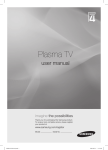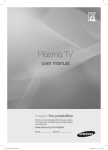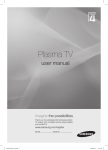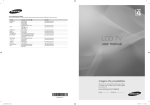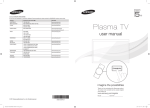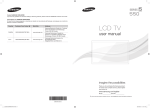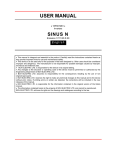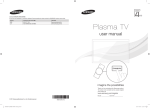Download Samsung PS-50B430 user manual Tv User Guide Manual Operating
Transcript
Plasma TV user manual imagine the possibilities Thank you for purchasing this Samsung product. To receive more complete service, please register your product at www.samsung.com/register Model Downloaded From TV-Manual.com Manuals Serial No. Contact SAMSUNG WORLDWIDE If you have any questions or comments relating to Samsung products, please contact the SAMSUNG customer care centre. Country Customer Care Centre Web Site AUSTRALIA 1300 362 603 www.samsung.com/au CHINA 800-810-5858 400-810-5858 010-6475 1880 www.samsung.com/cn HONG KONG : 3698-4698 www.samsung.com/hk INDIA 3030 8282 1800 110011 1-800-3000-8282 www.samsung.com/in INDONESIA 0800-112-8888 www.samsung.com/id JAPAN 0120-327-527 www.samsung.com/jp MALAYSIA 1800-88-9999 www.samsung.com/my NEW ZEALAND 0800 SAMSUNG (0800 726 786) www.samsung.com/nz PHILIPPINES 1800-10-SAMSUNG(726-7864) www.samsung.com/ph SINGAPORE 1800-SAMSUNG(726-7864) www.samsung.com/sg SOUTH AFRICA 0860-SAMSUNG(726-7864) www.samsung.com/za TAIWAN 0800-329-999 www.samsung.com/tw THAILAND 1800-29-3232 02-689-3232 www.samsung.com/th TURKEY 444 77 11 www.samsung.com/tr U.A.E 800-SAMSUNG (726-7864) 8000-4726 www.samsung.com/ae VIETNAM 1 800 588 889 www.samsung.com/vn BN68-01978A-00 BN68-01978A Downloaded From TV-Manual.com Manuals User Instructions Screen Image retention Do not display a still image (such as on a video game or when hooking up a PC to this PDP) on the plasma monitor panel for more than 2 hours as it can cause screen image retention. This image retention is also known as “screen burn”. To avoid such image retention, reduce the degree of brightness and contrast of the screen when displaying a still image. Height The PDP can normally operate only under 2000m in height. It might abnormally function at a place over 2000m in height so do not install and operate there. Heat on the top of the PDP TV The top side of the product may be hot after long period of use as heat dissipates from the panel through the vent hole in the upper part of the product. This is normal and does not indicate any defect or operation failure of the product. However, children should be prevented from touching the upper part of the product. The product is making a ‘cracking’ noise. A ‘cracking’ noise may occur when the product contracts or expands due to a change of surrounding environment such as temperature or humidity. This is normal and not a defect of the unit. Cell Defects The PDP uses a panel consisting of 2,360,000(HD-level) to 6,221,000(FHD-level) pixels which require sophisticated technology to produce. However, there may be few bright or dark pixels on the screen. These pixels will have no impact on the performance of the product. Avoid operating the TV at temperatures below 5°C(41°F) A still image displayed too long may cause permanent damage to the PDP Panel. Watching the PDP TV in 4:3 format for a long period of time may leave traces of borders displayed on the left, right and centre of the screen caused by the difference of light emission on the screen. Playing a DVD or a game console may cause similar effect to the screen. Damages caused by the above effect are not covered by the Warranty. Afterimage on the Screen. Displaying still images from Video games and PC for longer than a certain period of time may produce partial afterimages. To prevent this effect, reduce the ‘brightness’ and ‘contrast’ when displaying still images. Warranty - Warranty does not cover any damage caused by image retention. - Burn-in is not covered by the warranty. Installation Be sure to contact an authorized service centre, when installing your set in a location with heavy dust, high or low temperatures, high humidity, chemical substance and where it operates continually such as the airport, the train station etc. Failure to do so may cause a serious damage to your set. © 2009 Samsung Electronics Co., Ltd. All rights reserved. Downloaded From TV-Manual.com Manuals English - English Contents Connecting and Preparing Your TV Sound Control ■ ■ ■ ■ ■ ■ ■ ■ ■ ■ ■ ■ ■ Changing the Sound Setting.................................................... 16 ■ Selecting the Sound Mode....................................................... 17 Checking Parts........................................................................... 4 Using the Stand-Base................................................................ 4 How to assemble the Stand-Base (depending on the model).... 4 Viewing the Control Panel.......................................................... 5 Viewing the Connection Panel................................................... 6 Remote Control.......................................................................... 7 Installing Batteries in the Remote Control.................................. 8 Switching On and Off................................................................. 8 Placing Your Television in Standby Mode................................... 8 Viewing the Menus..................................................................... 9 Using the TOOLS Button............................................................ 9 Plug & Play Feature................................................................. 10 Channel Control ■ Storing Channels . .................................................................. 11 ■ Managing Channels................................................................. 12 Picture Control Function Description ■ ■ ■ ■ ■ Configuring the Setup Menu..................................................... 18 Viewing the Picture in Picture (PIP)......................................... 19 Setting the Time....................................................................... 20 Source List / Edit Name............................................................ 21 PC Display................................................................................ 22 Recommendations for Use ■ ■ ■ ■ ■ ■ Teletext Feature........................................................................ 23 Wall Mount Kit Specifications (VESA)...................................... 24 Preparing before installing Wall- Mount on the wall................. 25 Securing the TV to the Wall...................................................... 25 Troubleshooting........................................................................ 26 Specifications........................................................................... 27 ■ Changing the Picture Settings.................................................. 13 Symbol Press N O T Note One-Touch Button TOOLS English - Downloaded From TV-Manual.com Manuals Connecting and Preparing Your TV Checking Parts Owner’s Instructions Remote Control/ AAA Batteries (2ea) Warranty Card/Safety Guide Manual (Not available in all locations) Screw (4ea) Power Cord Cloth-Clean Cover-Bottom Holder-Ring (4ea) (Refer to page 25) Using the Stand-Base N Two or more people should carry the PDP. Never lay the PDP on the floor because of possible damage to the screen. Always keep the PDP upright. N The PDP can rotate 20 degrees in right and left directions. -20° ~ 20° How to assemble the Stand-Base (depending on the model) Using the 4 screws for securing the stand base and the monitor, firmly attach the monitor to the stand base. (The exterior of the set may be different than the picture.) Warning Firmly secure the stand to the TV before moving it, as the stand may fall and could cause serious injury. N Two or more people should carry the TV. Never lay the TV on the floor because of possible damage to the screen. Always store the TV upright. Downloaded From TV-Manual.com Manuals English - In case of installing your TV on the wall, close the cover (1) on the stand-base connection part using two screws for hiding. Viewing the Control Panel Front Panel buttons N The product colour and shape may vary depending on the model. 1 SOURCE Toggles between all the available input sources (TV, AV, Component1, Component2, HDMI1, HDMI2/DVI). N In the on-screen menu, use this button as you would use the ENTERE button on the remote control. 2 MENU Press to see an on-screen menu of your TV’s features. 3 + VOL Press to increase or decrease the volume. In the on-screen menu, use the + VOL - buttons as you would use the ◄ and ► buttons on the remote control. Downloaded From TV-Manual.com Manuals Touch each button to operate. 4 < CH > Press to change channels. In the on-screen menu, use the < CH > buttons as you would use the ▲ and ▼ buttons on the remote control. 5 POWER INDICATOR Blinks and turns off when the power is on and lights up in stand-by mode. 6 (POWER) Press to turn the TV on and off. 7 REMOTE CONTROL SENSOR Aim the remote control towards this spot on the TV. 8 SPEAKERS English - Viewing the Connection Panel TV Rear Panel 1 8 or Cable Television Network 2 or 3 4 5 7 6 N The product colour and shape may vary depending on the model. N Whenever you connect an audio or video system to your set, ensure that all elements are switched off. N When connecting an external device, match the colour of the connection terminal to the cable. 1 SERVICE 1, 2 Connector for service. 2 POWER IN Connect the supplied power cord. 3 AV IN 1 (AUDIO R/L / VIDEO) Video and audio inputs for external devices, such as a camcorder or VCR. 7 HDMI IN 1, 2(DVI) - No additional Audio connection is needed for an HDMI to HDMI connection. - Whenusing an HDMI/DVI cable connection, you must use the HDMI IN 2(DVI) jack. N What is HDMI? - “High Definition Multimedia interface” allows the transmission of high definition digital video data and multiple channels of digital audio. - The HDMI/DVI terminal supports DVI connection to an extended device with the appropriate cable (not supplied). The difference between HDMI and DVI is that the HDMI device is smaller in size, has the HDCP (High Bandwidth Digital Copy Protection) coding feature installed, and supports multi - channel digital audio. 4 COMPONENT IN 1, 2 Audio (AUDIO R/L) and video (Y/PB/PR) inputs for Component. 5 HEADPHONES JACK You can connect a set of headphones if you wish to watch a television programme without disturbing the other people in the room. N Prolonged use of headphones at a high volume may damage your hearing 6 AUDIO OUT (AUDIO R/L) Connect RCA audio signals from the TV to an external source, such as Audio equipment. DVI AUDIO IN DVI audio outputs for external devices. 8 ANT IN 75Ω Coaxial connector for Air/Cable Network. Supported modes for HDMI/DVI and Component HDMI/DVI 50Hz HDMI/DVI 60Hz Component Downloaded From TV-Manual.com Manuals English - 480i X X O 480p X O O 576i X X O 576p O X O 720p 1080i 1080p O O O O O O O O O Remote Control You can use the remote control up to a distance of about 23 feet from the TV. N The performance of the remote control may be affected by bright light. 1 POWER button (turns the TV on and off) 2 Selects the TV mode directly. 3 Number buttons for direct channel access 4 Use to select on-screen menu items 5 Temporary sound switch-off Volume increase Volume decrease 7 Available source selection 8 Channel control button 9 Use to quickly select frequently used functions. 0 Control the cursor in the menu ! Use to see information on the current broadcast @ Use these buttons in the Channel list, etc. $ Previous channel 6 Teletext Functions 2 Exit from the teletext display (depending on the model) 7 Teletext mode selection (LIST/FLOF) 8 Teletext store 9 Teletext size ! Teletext reveal @ Fastext topic selection # Teletext display/mix both teletext information and the normal broadcast $ Teletext sub page :Teletext next page % P P :Teletext previous page ^ Teletext index * Teletext hold ( Teletext cancel Next channel Previous channel ^ Displays the main on-screen menu & Selects the HDMI mode directly * Returns to the previous menu ( Exit the on-screen menu ) Press to select the sound mode. a Picture size selection % Downloaded From TV-Manual.com Manuals English - Installing Batteries in the Remote Control 1. Lift the cover at the back of the remote control upward as shown in the figure. 2. Install two AAA size batteries. N Make sure to match the ‘+’ and ‘–’ ends of the batteries with the diagram inside the compartment. 3. Close the cover. N Remove the batteries and store them in a cool, dry place if you won’t be using the remote control for a long time. N If the remote control doesn’t work, check the following 1. Is the TV power on? 2. Are the plus and minus ends of the batteries reversed? 3. Are the batteries drained? 4. Is there a power outage or is the power cord unplugged? 5. Is there a special fluorescent light or neon sign nearby? Switching On and Off The mains lead is attached to the rear of your set. 1. Plug the mains lead into an appropriate socket. N The standby indicator lights up on your set. 2. Press the POWERP button on your set. N You also can press the POWERP button or the TV button on the remote control to turn the TV on. The programme that you were watching last is reselected automatically. 3. Press the numeric button (0~9) or channel up / down (< / >) button on the remote control or < CH > button on your set. N When you switch the set on for the very first time, you will be asked to choose language in which the menus are to be displayed. 4. To switch your set off, press the POWERP button again. Placing Your Television in Standby Mode Your set can be placed in standby mode in order to reduce the power consumption. The standby mode can be useful when you wish to interrupt viewing temporarily (during a meal, for example). 1. Press the POWERP button on the remote control. N The screen is turned off and a red standby indicator appears on your set. 2. To switch your set back on, simply press the POWERP, numeric buttons (0~9), TV button or channel up / down (< / >) button again. N Do not leave your set in standby mode for long periods of time (when you are away on holiday, for example). It is best to unplug the set from the mains and aerial. Downloaded From TV-Manual.com Manuals English - Viewing the Menus 1. With the power on, press the MENU button. The main menu appears on the screen. The menu’s left side has icons: Picture, Sound, Channel, Setup, Input. 2. Press the ▲ or ▼ button to select one of the icons. Then press the ENTERE button to access the icon’s sub-menu. 3. Press the EXIT button to exit. TV Picture Mode : Standard Cell Light Contrast Brightness Sharpness Colour Tint (G/R) G 50 R Advanced Settings Picture Options Reset : OK N The on-screen menus disappear from the screen after about one minute. Move Enter 8 95 45 50 50 50 Exit Using the TOOLS Button You can use the TOOLS button to select your frequently used functions quickly and easily. The TOOLS menu changes depending on which external input mode you are viewing. 1. Press the TOOLS button. The TOOLS menu will appear. 2. Press the ▲ or ▼ button to select a menu, then press the ENTERE button. 3. Press the ▲ / ▼ / ◄ / ► / ENTERE buttons to display, change, or use the selected items. For a more detailed description of each function, refer to the corresponding page. • • • • • Picture Mode, see page 13 Sleep Timer, see page 20 SRS TruSurround HD, see page 16 Energy saving, see page 18 Dual I-II, see page 17 TOOLS Picture Mode : Standard Sleep Timer : Off SRS TruSurround HD : Off Energy saving : Off Dual I-II : Mono Move Downloaded From TV-Manual.com Manuals English - ����� Enter Exit Plug & Play Feature When the TV is initially powered on, basic settings proceed automatically and subsequently. N The Screen Saver is activated if there is no remote control key input for longer than 1 minute while Plug & Play is running. N The Screen Saver is activated if there is no operating signal for longer than 15 minutes. 1. Press the POWER button on the remote control. Menu Language menu is displayed. 2. Select the appropriate language by pressing the ▲ or ▼ button. Press the ENTERE button. The message Select ‘Home Use’ when installing this TV in your home. is displayed. 3. Press the ◄ or ► button to select Store Demo or Home Use, then the ENTERE button. Plug & Play English ไทย 中文 Menu Language Move N We recommend setting the TV to Home Use mode for the best picture in your home ����� Enter (Differs in each country) environment. N Store Demo mode is only intended for use in retail environments. N If the unit is accidentally set to Store Demo mode and you want to return to Home Use (Standard): Press the Volume button on the TV. When the volume OSD is displayed, press and hold the MENU button on the TV for 5 seconds. 4. The message Check antenna input. is displayed with OK selected. Press the ENTERE button. Area menu is displayed. 5. Select your country or area by pressing the ▲ or ▼ button, then press the ENTERE button. Auto Store menu is displayed. 6. Press the ENTERE button to start search the channels. The channel search will start automatically. After all the available channels are stored, Clock Set menu is automatically displayed. N To stop the search before it has finished, press the ENTERE button with Stop selected. 7. Press the ◄ or ► button to select Month, Day, Year, Hour, Minute, or am/pm. Set these by pressing the ▲ or ▼ button. N You can set the Month, Day, Year, Hour, and Minute directly by pressing the numeric buttons on the remote control. 8. Press the ENTERE button to confirm your setting. The message Enjoy your TV. is displayed. When you have finished, press the ENTERE button. If you want to reset this feature... 1. Press the MENU button to display the menu. 2. Press the ▲ or ▼ button to select Setup, then press the ENTERE button. 3. Press the ENTERE button again to select Plug & Play. The message Start Plug & Play. is displayed. TV Setup Plug & Play Language :English Time Child Lock : On Change PIN Game Mode : Off Melody : Off Energy Saving : Off PIP Downloaded From TV-Manual.com Manuals English - 10 Move Enter Return Channel Control Storing Channels ❑ Area TV Channel You can change the desired area. Area : Asia/Europe Auto Store Manual Store Channel List Sort Name Fine Tune ❑ Auto Store Scans for all channels with active broadcast stations (and availability depends on your country) and stores them in the TV's memory. ❑ Manual Store Move Enter Return Scans for a channel manually and stores it in the TV’s memory. • Programme (Programme number to be assigned to a channel): Sets the programme number using the ▲, ▼ or number (0~9) buttons. • Colour System → Auto / PAL / SECAM / NTSC4.43 / NTSC 3.58: Sets the colour system value using the ▲ or ▼ button. • Sound System → BG / DK / I / M: Sets the sound system value using the ▲ or ▼ button. • Channel (When you know the number of the channel to be stored): Press the ▲ or ▼ button to select C (Air channel) or S (Cable channel). Press the ► button, then press the ▲, ▼ or number (0~9) buttons to select the required number. N You can also select the channel number directly by pressing the number (0~9) buttons. N If there is abnormal sound or no sound, reselect the sound standard required. • Search (When you do not know the channel numbers): Press the ▲ or ▼ button to start the search. The tuner scans the frequency range until the first channel or the channel that you selected is received on the screen. • Store (When you store the channel and associated programme number): Set to OK by pressing the ENTERE button. N Channel mode - P (Programme mode): When completing tuning, the broadcasting stations in your area have been assigned to position numbers from P00 to P99. You can select a channel by entering the position number in this mode. - C (Air channel mode): You can select a channel by entering the assigned number to each air broadcasting station in this mode. - S (Cable channel mode): You can select a channel by entering the assigned number for each cable channel in this mode. ❑ Fine Tune If the reception is clear, you do not have to fine tune the channel, as this is done automatically during the search and store operation. If the signal is weak or distorted, you may have to fine tune the channel manually. N Fine tuned channels that have been saved are marked with an asterisk *. N If you do not store the fine-tuned channel in memory, adjustments are not saved. N To reset the fine-tuning, select Reset by pressing the ▼ button and then press the ENTERE button. Downloaded From TV-Manual.com Manuals English - 11 Managing Channels Using the Channel Manager, you can conveniently add/delete or lock/unlock channels. TV Channel Area : Asia/Europe Auto Store Manual Store Channel List Sort Name Fine Tune ❑ Channel List Adding / Deleting channels Using the Channel List, you can add or delete channels. N Move to the ( ) field by pressing the ▲/▼/◄/► buttons, select a channel to be added, and press the ENTERE button to add the channel. N If you press the ENTERE button again, the (c) symbol next to the channel disappears and the channel is not added. Locking / Unlocking channels This feature allows you to prevent unauthorized users, such as children, from watching unsuitable programmes by muting out video and audio. This function is available only when the Child Lock is set to on. (see page 18) N Move to the (\) field by pressing the ▲/▼/◄/► buttons, select a channel to be locked, and press the ENTERE button. N The PIN number input screen appears. Enter your 4 digit PIN number. N The default PIN number of a new TV set is ‘0-0-0-0’. You can change the PIN, by selecting Change PIN from the menu. N If you press the ENTERE button again, the (c) symbol next to the channel disappears and the channel lock is canceled. N A blue screen is displayed when Child Lock is activated. O You can select these options simply by pressing the CH LIST button on the remote control. Move P 2 Enter Channel List C46 Return 1 / 10 Prog. 0 1 2 3 4 5 6 7 8 9 C45 C46 C47 C48 C49 C50 C51 C52 C53 C54 Add Move Page Lock Enter Return ❑ Sort This operation allows you to change the programme numbers of the stored channels. This operation may be necessary after using the auto store. ❑ Name Channel names will be assigned automatically when channel information is broadcast. These names can be changed, allowing you to assign new names. Downloaded From TV-Manual.com Manuals English - 12 Picture Control Changing the Picture Settings ❑ Mode You can select the type of picture which best corresponds to your viewing requirements. • Dynamic: Selects the picture for high-definition in a bright room. • Standard: Selects the picture for the optimum display in a normal environment. • Movie: Selects the picture for viewing movies in a dark room. TV Picture Mode : Standard Cell Light 8 Contrast 95 Brightness 45 Sharpness 50 Colour 50 Tint (G/R) G 50 R 50 Advanced Settings Picture Options Reset : OK T Press the TOOLS button to display TOOLS menu. You can also set the picture mode by selecting TOOLS → Picture Mode. ❑ Cell Light / Contrast / Brightness / Sharpness / Colour / Tint (G/R) Move Enter Return Your television has several setting options that allow you to control the picture quality. • Cell Light: Adjusts the pixel brightness. • Contrast: Adjusts the contrast level of the picture. • Brightness: Adjusts the brightness level of the picture. • Sharpness: Adjusts the edge definition of the picture. • Colour: Adjusts Colour saturation of the picture. • Tint (G/R): Adjusts the Colour tint of the picture. N Select a picture mode to be adjusted first. The adjusted values are saved for each picture mode. N When you make changes to Cell Light, Contrast, Brightness, Sharpness, Colour, or Tint (G/R), the OSD will be adjusted accordingly. N In TV, AV modes of the PAL system, you cannot use the Tint Function. N Settings can be adjusted and stored for each external device you have connected to an input of the TV. N The energy consumed during use can be significantly reduced if the level of brightness of the picture is reduced, and then this will reduce the overall running cost. ❑ Advanced Settings You can adjust the Advanced Settings for your screen including the colour and contrast. N Advanced Settings is available in Standard or Movie mode. TV Picture Mode : Standard Cell Light Contrast Brightness Sharpness Colour Tint (G/R) G 50 R Advanced Settings Picture Options Reset : OK Black Tone → Off / Dark / Darker / Darkest You can select the black level on the screen to adjust the screen depth. Dynamic Contrast → Off / Low / Medium / High You can adjust the screen contrast so that the optimal contrast is provided. Gamma You can adjust the primary colour (Red, Green, Blue) Intensity. Colour Space Colour Space is a colour matrix composed of red, green and blue colours. Select your favourite colour space to experience the most natural colour. • Auto: Automatically sets the colour range depending on the input video source. • Native: Sets the colour range wider than the that of the input video source. White Balance You can adjust the colour temperature for more natural picture colours. • R-Offset / G-Offset / B-Offset / R-Gain / G-Gain / B-Gain: Changing the adjustment value will refresh the adjusted screen. • Reset: The previously adjusted white balance will be reset to the factory defaults. Flesh Tone You can adjust the flesh tone to be more or less red. N Changing the adjustment value will refresh the adjusted screen. Edge Enhancement → Off / On You can emphasize object boundaries in the picture. Move Enter 8 95 45 50 50 50 Return Continued... Downloaded From TV-Manual.com Manuals English - 13 ❑ Picture Options You can customize the additional picture settings to suit your preference. TV Picture Mode : Standard Cell Light 8 Contrast 95 Brightness 45 Sharpness 50 Colour 50 Tint (G/R) G 50 R 50 Advanced Settings Picture Options Reset : OK Colour Tone →� �� Cool / Normal / Warm1 / Warm2 You can select the most comfortable colour tone to your eyes. N The adjusted values are stored according to the selected Picture mode. N Warm1 or Warm2 is only activated when the picture mode is Movie. Size You can select the picture size which best corresponds to your viewing requirements. Move Enter Return • 16:9: Adjusts the picture size to 16:9 appropriate for DVDs or wide broadcasting. • Wide Zoom: Magnify the size of the picture more than 4:3. • Zoom: Magnifies the 16:9 wide picture (in the vertical direction) to fit the screen size. • 4:3: This is the default setting for a video movie or normal broadcasting. • Screen Fit: Use the function to see the full image without any cutoff when HDMI (720p / 1080i / 1080p) or Component (1080i / 1080p) signals are input. N The picture size options may vary depending on the input source. N The items available may differ depending on the selected mode. N Settings can be adjusted and stored for each external device you have connected to an input of the TV. N Temporary image retention may occur when viewing a static image on the set for more than two hours. N Wide Zoom: Press the ► button to select , then press the ENTERE button. Press the ▲ or ▼ button to move the screen up / down. Then press the ENTERE button. N Zoom: Press the ► button to select , then press the ENTERE button. Press the ▲ or ▼ button to move the picture up and down. Then press the ENTERE button. Press the ► button to select , then press the ENTERE button. Press the ▲ or ▼ button to magnify or reduce the picture size in the vertical direction. Then press the ENTERE button. N After selecting Screen Fit in HDMI (720p / 1080i / 1080p) or Component (1080i / 1080p) mode: Select Position by pressing the ◄ or ►button. Use the ▲, ▼, ◄ or ► button to move the picture. N Reset: Press the ◄ or ► button to select Reset, then press the ENTERE button. You can initialize the setting. N If you use the Screen Fit function with HDMI 720p input, 1 line will be cut at the top, bottom, left and right as in the overscan function. O You can select these options simply by pressing the P.SIZE button on the remote control. Digital NR →� �� Off / Low / Medium / High / Auto If the broadcast signal received by your TV is weak, you can activate the Digital Noise Reduction feature to help reduce any static and ghosting that may appear on the screen. N When the signal is weak, select one of the other options until the best picture is displayed. HDMI Black Level →� �� Normal / Low You can directly select the black level on the screen to adjust the screen depth. N This function is active only when the external input connects to HDMI (RGB signals). Film Mode You can optimize the picture mode for watching movies. • Off : Turn the Film Mode function off. • Auto: Automatically adjusts the picture for the best quality when watching a film. N Film mode is supported in TV, Video, Component(480i / 576i / 1080i) and HDMI(1080i). Continued... Downloaded From TV-Manual.com Manuals English - 14 Screen Burn Protection Configures the Screen Burn Protection Options to prevent and reduce pixel burn. When an image remains in one position too long, it may cause a permanent burn on the screen. • Pixel Shift: To reduce the possibility of screen burn, this unit is equipped with screen burn prevention technology. This technology enables you to set picture movement up/down (Vertical Line) and side to side (Horizontal). The Time setting allows you to program the time between movement of the picture in minutes. N N N N Set Pixel Shift to On by pressing the ▲ or ▼ button, then press the ENTERE button. Select the required option by pressing the ▲ or ▼ button, then press the ENTERE button. Available options: Horizontal, Vertical, Time. Optimum condition for pixel shift Item TV/AV/Component/HDMI Horizontal 0~4 2 Vertical 0~4 2 Time (min) 1~4 min 2 min N The Pixel Shift value may differ depending on the monitor size (inches) and mode. N This function is not available in the Screen Fit mode. • Scrolling: This function helps remove after images on the screen by moving all the pixels on the PDP according to a pattern Use this function when there are remaining after images or symbols on the screen especially when you displayed a still image on the screen for a long time. • Side Grey: When you watch TV with the screen ratio of 4:3, the screen is prevented from any damage by adjusting the white balance on both extreme left and right sides. - Dark: When you set the screen ratio to 4:3, it darkens the left and right sides. - Light: When you set the screen ratio to 4:3, it brightens the left and right sides. ❑ Reset → OK / Cancel Resets all picture settings to the default values. N Select a picture mode to be reset. The reset is performed for each picture mode. TV Picture Mode : Standard Cell Light 8 Contrast 95 Brightness 45 Sharpness 50 Colour 50 Tint (G/R) G 50 R 50 Advanced Settings Picture Options Reset : OK Downloaded From TV-Manual.com Manuals English - 15 Move Enter Return Sound Control Changing the Sound Setting ❑ Mode TV You can select the type of special sound effect to be used when watching a given broadcast. • Standard: Selects the normal sound mode. • Music: Emphasizes music over voices. • Movie: Provides the best sound for movies. • Clear Voice: Emphasizes voice over other sounds. • Custom: Recalls your customized sound settings. (see Customizing the Sound) O You can select these options simply by pressing the S.MODE button on the remote control. Sound Mode :Standard Equalizer SRS TruSurround HD :Off Auto Volume :Off Select Speaker : TV Speaker Sound Select :Main Move Enter Return ❑ Equalizer The sound settings can be adjusted to suit your personal preferences. • Balance: Controls the balance between the right and left speakers. • 100Hz / 300Hz / 1KHz / 3KHz / 10KHz (Bandwidth Adjustment): To adjust the level of different bandwidth frequencies ❑ SRS TruSurround HD → Off / On SRS TruSurround HD is the combined technology of TruSurround and FOCUS, TruBass. SRS TruSurround HD is down mixing technology that makes the Surround Sound effect of virtual 5.1 channel via two speakers. This function provide not only rich deep bass at a low-pitched sound but also improve the resolution at a high-pitched sound. T Press the TOOLS button to display Tools menu. You can also set the SRS TruSurround HD by selecting Tools → SRS TruSurround HD. N If the sound is abnormal while TV is playing music, please adjust the equalizer and SRS TruSurround HD (Off/On). TruSurround HD, SRS and the symbol are trademarks of SRS Labs, Inc. TruSurround HD technology is incorporated under license from SRS Labs, Inc. →��������� Off / On ❑ Auto Volume ���������� Each broadcasting station has its own signal conditions, and so it is not easy to adjust the volume every time the channel is changed. This feature lets you automatically adjust the volume of the desired channel by lowering the sound output when the modulation signal is high or by raising the sound output when the modulation signal is low. ❑ Select Speaker → External Speaker / TV Speaker If you want to hear the sound through separate speakers, cancel the internal amplifier. +, M MUTE buttons do not operate when the Select Speaker is set to External Speaker. N The – N If you select External Speaker in the Select Speaker menu, the sound settings will be limited. TV's Internal Speakers Audio Out (L / R Out) to Sound System TV / AV / Component / HDMI TV / AV / Component / HDMI TV Speaker Speaker Output Sound Output External Speaker Mute Sound Output Video No Signal Mute Mute Continued... Downloaded From TV-Manual.com Manuals English - 16 ❑ Sound Select When the PIP feature is activated, you can listen to the sound of the sub (PIP) picture. • Main: Use to listen to the sound of the main picture. • Sub: Used to listen to the sound of the sub picture. TV Sound Mode :Standard Equalizer SRS TruSurround HD :Off Auto Volume :Off Select Speaker : TV Speaker Sound Select :Main Move Enter Return Selecting the Sound Mode When you set to Dual l ll, the current sound mode is displayed on the screen. NICAM Stereo Type of broadcast On-screen indication Regular broadcast (Standard audio) Mono (Normal use) Regular + NICAM Mono NICAM Mono (Normal) NICAM-Stereo NICAM Stereo Mono (Normal) NICAM Dual-1 NICAM Dual-I/II A2 Stereo Regular broadcast (Standard audio) Bilingual or DUAL-I/II Dual I Stereo Stereo NICAM Dual-2 T Press the TOOLS button to display Tools menu. You can also set the Dual l ll HD by selecting Tools → Dual l ll. Downloaded From TV-Manual.com Manuals Mono (Normal) Mono (Normal use) N If the stereo signal is weak and an automatic switching occurs, then switch to the mono. N This function is only activated in stereo sound signal. It is deactivated in mono sound signal. N This function is only available in TV mode. English - 17 Dual II Mono (Forced mono) Function Description Configuring the Setup Menu ❑ Language It is variable depending on the model. When you start using the television for the first time, you must select the language which will be used for displaying menus and indications. TV Setup Plug & Play Language :English Time Child Lock :On Change PIN Game Mode : Off Melody : Off Energy Saving : Off PIP ❑ Child Lock → Off / On This feature allows you to prevent unauthorized users, such as children, from watching unsuitable programmes by muting out video and audio. N Before the setup screen appears, the PIN number input screen appears. Enter your 4 digit PIN number. N The default PIN number of a new TV set is ‘0-0-0-0’. You can change the PIN by selecting Change PIN from the menu. N You can lock some channels in Channel List. (refer to page 12) N Child Lock is available only in TV mode. . Move Enter Return ❑ Change PIN You can change your personal ID number that is required to set up the TV. N Before the setup screen appears, the PIN number input screen appears. Enter your 4 digit PIN number. N The default PIN number of a new TV set is ‘0-0-0-0’. N If you forget the PIN code, press the remote control buttons in the following sequence, which resets the PIN to ‘0-0-0-0’: POWER (Off), MMUTE, 8, 2, 4, POWER (On). ❑ Game Mode When connecting to a game console such as PlayStationTM or XboxTM, you can enjoy a more realistic gaming experience by selecting the game menu. When the Game Mode is On • Picture Mode is automatically changed to Standard and users cannot change the mode. • Sound Mode is automatically changed to Custom and users cannot change the mode. Adjust the sound using the equalizer. • The Reset in the Sound menu is activated. Reset function initializes the Equalizer settings to the factory default setting. N Game Mode is not available in regular TV mode or Game Mode set to Off. N If the picture is poor when external device is connected to TV, check if Game Mode is On. N This function supports only game function. N If you display the TV menu in Game mode, the screen shakes slightly. N The mark ( ) appears on the screen which means that Game Mode is on with the selected source. ❑ Melody → Off / Low / Medium / High The TV power on / off melody sound can be adjusted. N The Melody does not play - When no sound is output from the TV because the M MUTE button has been pressed. - When no sound is output from the TV because the – (Volume) button has been pressed. - When the TV is turned off by Sleep Timer function. ❑ Energy Saving This feature adjusts the brightness of the TV in order to reduce power consumption. When watching TV at night, set the Energy Saving mode option to High to reduce eye fatigue as well as power consumption. • Off: Turns off the energy saving function. • Low: Sets the TV to low energy saving mode. • Medium: Sets the TV to medium energy saving mode. • High: Sets the TV to high energy saving mode. T Press the TOOLS button to display TOOLS menu. You can also set the Energy Saving option by selecting TOOLS → Energy Saving. Downloaded From TV-Manual.com Manuals English - 18 Viewing the Picture in Picture (PIP) You can display a sub picture within the main picture of set programme or video input. In this way, you can watch the picture of set programme or video input from any connected equipment while watching the main picture. TV Setup Plug & Play Language :English Time Child Lock :On Change PIN Game Mode : Off Melody : Off Energy Saving : Off PIP N You may notice that the picture in the PIP window becomes slightly unnatural when you use the main screen to view a game or karaoke. T Press the TOOLS button to display TOOLS menu. You can also configure PIP related settings by selecting TOOLS → PIP. ❑ PIP → On / Off You can activate or deactivate the PIP function. Main picture Component1, Component2 HDMI1, HDMI2/DVI TV, AV Size → / / You can select a size of the sub-picture. N If main picture is in Component mode, Size is not available. Position → / / / You can select a position of the sub-picture. , ) mode, Position cannot be selected. N In Double ( Programme You can select a channel of the sub-picture only when the Source is set to TV. English - 19 Enter Return PIP Sub picture Source → TV / AV You can select a source of the sub-picture. N You can select these options simply by pressing the SOURCE button on the remote control. Downloaded From TV-Manual.com Manuals Move TV PIP Source Size Position Programme :On :TV : : : P 1 Move Enter Return Setting the Time Setting the clock is necessary in order to use the various timer features of the TV. N The current time will appear every time you press the INFO button. N If you disconnect the power cord, you have to set the clock again. TV Setup Plug & Play Language :English Time Child Lock :On Change PIN Game Mode : Off Melody : Off Energy Saving : Off PIP ❑ Clock Set You can set the current time manually. N You can set the Month, Day, Year, Hour, Minute directly by pressing the number buttons on the remote control. ❑ Sleep Timer → Off / 30min / 60min / 90min / 120min / 150min / 180min The sleep timer automatically shuts off the TV after a preset time. N The TV automatically switches to standby mode when the timer reaches 0. N To cancel the Sleep Timer function, select Off. T Press the TOOLS button to display TOOLS menu. You can also set the sleep timer by selecting TOOLS → Sleep Timer. Move TV Enter Return Time Clock Set Sleep Timer Timer 1 Timer 2 Timer 3 :−− : −− am :Off :Inactivated :Inactivated :Inactivated ❑ Timer 1 / Timer 2 / Timer 3 Three different on / off timer settings can be made. Move Enter Return • On Time: ������������������������������������������������������ (To activate timer with the setting you’ve chosen, set to Activate.) • Off Time: �������������������������������������������������������� (To activate timer with the setting you’ve chosen, set to Activate.) • Repeat: ������� Once, Everyday, Mon~Fri, Mon~Sat, Sat~Sun. • Volume: Set ������������ the required volume level. • Programme : When the On Time is active, you can turn on a specific channel. N Y���������������������������� ou must set the clock first. N You can set the hour, minute and programme by pressing the number buttons on the remote control. N Auto Power Off When you set the timer On, the television will eventually turn off, if no controls are operated for 3 hours after the TV was turned on by the timer. This function is only available in timer On mode and prevents overheating, which may occur if a TV is on for too long time. Downloaded From TV-Manual.com Manuals English - 20 Source List / Edit Name ❑ Source List Use to select TV or other external input sources such as DVD players or Cable Box / Satellite receivers (Set-Top Box) connected to the TV. Use to select the input source of your choice. TV Input Source List : TV Edit Name TV, AV, Component1, Component2, HDMI1, HDMI2/DVI. N You can choose only those external devices that are connected to the TV. Move Enter Return N Press the SOURCE button on the remote control to view an external signal source. TV mode can be selected by pressing the TV button, number buttons (0~9), and the P < / > button on the remote control. O You can also watch HDMI mode simply by pressing the HDMI button on the remote control. ❑ Edit Name VCR / DVD / Cable STB / Satellite STB / PVR STB / AV Receiver / Game / Camcorder / PC / DVI PC / DVI / TV / IPTV / Blu-ray / HD DVD / DMA You can name the device connected to the input jacks to make your input source selection easier. N When a PC with a resolution of PS42B430: 640x480@60Hz, PS50B430: 640x480@60, 1280x720@60 is connected to the HDMI IN 2(DVI) port, you should set the HDMI2/DVI mode to PC in the Edit Name of the Input mode. N When connecting an HDMI/DVI cable to the HDMI IN (DVI) port, you should set the HDMI/DVI mode to DVI or DVI PC in the Edit Name of the Input mode. In this case, a separate sound connection is required. Downloaded From TV-Manual.com Manuals English - 21 PC Display ❑ Setting Up Your PC Software (Based on Windows XP) 1. 2. 3. 4. The Windows display-settings for a typical computer are shown below. The actual screens on your PC will probably be different, depending upon your particular version of Windows and your particular video card. However, even if your actual screens look different, the same basic set-up information will apply in almost all cases. (If not, contact your computer manufacturer or Samsung Dealer.) First, click on ‘Control Panel’ on the Windows start menu. When the control panel window appears, click on ‘Appearance and Themes’ and a display dialog-box will appear. When the control panel window appears, click on ‘Display’ and a display dialog-box will appear. Navigate to the ‘Settings’ tab on the display dialog-box. The correct size setting (resolution) Optimum: - PS42B430 : 1024x768 pixels - PS50B430 : 1360x768 pixels If a vertical-frequency option exists on your display settings dialog box, the correct value is ‘60’ or ‘60 Hz’. Otherwise, just click ‘OK’ and exit the dialog box. ❑ Display Modes Both screen position and size will vary depending on the type of PC monitor and its resolution. The resolutions in the table are recommended. HDMI/DVI Input Mode IBM MAC Resolution Horizontal Frequency (kHz) Vertical Frequency (Hz) Pixel Clock Frequency (MHz) Sync Polarity (H/V) PS42B430 PS50B430 640 x 350 31.469 70.086 25.175 +/- ✓ ✓ 720 x 400 31.469 70.087 28.322 -/+ ✓ ✓ 640 x 480 35.000 66.667 30.240 -/- ✓ ✓ 832 x 624 49.726 74.551 57.284 -/- ✓ ✓ 31.469 59.940 25.175 -/- ✓ ✓ 37.861 72.809 31.500 -/- ✓ ✓ 37.500 75.000 31.500 -/- ✓ ✓ 37.879 60.317 40.000 +/+ ✓ ✓ 48.077 72.188 50.000 +/+ ✓ ✓ 46.875 75.000 49.500 +/+ ✓ ✓ 48.363 60.004 65.000 -/- ✓ ✓ 56.476 70.069 75.000 -/- ✓ ✓ 60.023 75.029 78.750 +/+ ✓ ✓ 640 x 480 VESA DMT 800 x 600 1024 x 768 VESA CVT VESA GTF ✓ 1360 x 768 47.712 60.015 85.500 +/+ 720 x 576 35.910 59.950 32.750 -/+ 56.456 74.777 95.750 -/+ ✓ 44.772 59.855 74.500 -/+ ✓ 52.500 70.000 89.040 -/+ ✓ 1280 x 720 1280 x 720 N When using an HDMI/DVI cable connection, you must use the HDMI IN 2(DVI) jack. N The interlace mode is not supported. N The set might operate abnormally if a non-standard video format is selected. Downloaded From TV-Manual.com Manuals English - 22 ✓ ✓ Recommendations for Use Teletext Feature Most television stations provide written information services via Teletext. The index page of the teletext service gives you information on how to use the service. In addition, you can select various options to suit your requirements by using the remote control buttons. N For teletext information to be displayed correctly, channel reception must be stable. Otherwise, information may be missing or some pages may not be displayed. 1 : (exit) Exit from the teletext display. 2 6 (index) Used to display the index (contents) page at any time while you are viewing teletext. 1 3 8 (store) Used to store the teletext pages. 4 4 (size) Press to display the double-size letters in the upper half of the screen. For lower half of the screen, press it again. To display normal screen, press it once again. 5 5 (reveal) Used to display the hidden text (answers to quiz games, for example). To display normal screen, press it again. 6 / (teletext on/mix) Press to activate teletext mode after selecting the channel providing the teletext service. Press it twice to overlap the teletext with the current broadcasting screen. 7 1 (sub-page) Used to display the available sub-page. 7 8 9 2 3 4 0 ! 8 2 (page up) Used to display the next teletext page. 9 3 (page down) Used to display the previous teletext page. 5 0 0 (mode) Press to select the teletext mode (LIST/FLOF). If you press it in the LIST mode, it switches into the List save mode. In the List save mode, you can save teletext page into list using the 8(store) button. @ # 6 ! 9 (hold) Used to hold the display on a given page if the selected page is linked with several secondary pages which follow on automatically. To resume, press it again. @ 7 (cancel) Used to display the broadcast when searching for a page. # Colour buttons (red/green/yellow/blue) If the FASTEXT system is used by a broadcasting company, the different topics covered on a teletext page are colour-coded and can be selected by pressing the coloured buttons. Press one of them corresponding to the required. The page is displayed with other coloured information that can be selected in the same way. To display the previous or next page, press the corresponding coloured button. N You can change teletext pages by pressing the numeric buttons on the remote control. Continued... Downloaded From TV-Manual.com Manuals English - 23 The teletext pages are organized according to six categories: Part Contents A Selected page number. B Broadcasting channel identity. C Current page number or search indications. D Date and time. E Text. F Status information. FASTEXT information. N Teletext information is often divided between several pages displayed in sequence, which can be accessed by: - Entering the page number - Selecting a title in a list - Selecting a coloured heading (FASTEXT system) O Press the TV button to exit from the teletext display. Wall Mount Kit Specifications (VESA) Install your wall mount on a solid wall perpendicular to the floor. When attaching to other building materials, please contact your nearest dealer. If installed on a ceiling or slanted wall, it may fall and result in severe personal injury. Product Family LCD-TV PDP-TV N N N N N N N N inch VESA Spec. (A * B) 19" ~22" 100 * 100 23"~29" 200 * 100 30"~40" 200 * 200 46"~55" 400 * 400 57"~70" 800 * 400 80" ~ 1400 * 800 42"~ 50" 400 * 400 58"~ 63" 600 * 400 70" ~ 800 * 400 80" ~ 1400 * 800 Standard Screw Quantity M4 M6 4 M8 4 M8 6 4 4 We provided the standard dimensions for wall mount kits as shown in the table above. When purchasing our wall mount kit, a detailed installation manual and all parts necessary for assembly are provided. Do not use screws longer than the standard dimension, as they may cause damage to the inside of the TV set. For wall mounts that do not comply with the VESA standard screw specifications, the length of the screws may differ depending on their specifications. Do not use screws that do not comply with the VESA standard screw specifications. Do not use fasten the screws too strongly, this may damage the product or cause the product to fall, leading to personal injury. Samsung is not liable for these kinds of accidents. Samsung is not liable for product damage or personal injury when a non-VESA or non-specified wall mount is used or the consumer fails to follow the product installation instructions. Our 57” and 63” models do not comply with VESA Specifications. Therefore, you should use our dedicated wall mount kit for this model. Do not exceed 15 degrees tilt when mounting this TV. Do not install your Wall Mount Kit while your TV is turned on. It may result in personal injury due to electric shock. Downloaded From TV-Manual.com Manuals English - 24 Preparing before installing Wall- Mount on the wall Case A. Installing the SAMSUNG Wall-Mount Case B. Installing another company’s Wall-Mount 1. Install the Wall Mount with a torque range of 15kgf·cm or less. Use care as the parts can be damaged if the torque is out of the specified range. 2.Accessory Kit contains Holder–Ring [②] for installing other company’s Wall-Mount on Samsung TV. (Case B) N Screw down the hole [①] when installing wall-mount on the wall. 경고 경고 주의 Securing the TV to the Wall Pulling, pushing, or climbing on the TV may cause the TV to fall. In particular, ensure your children do not hang over or destabilize the TV; doing so may cause the TV to tip over, causing serious injuries or death. Follow all 주의 safety precautions provided on the included Safety Flyer. For added stability, install the anti-fall device for safety purposes, as follows. Wall Wall To avoid the TV from falling 1. Put the screws into the clamps and firmly fasten them onto the wall. Confirm that the screws have been firmly installed onto the wall. N You may need additional material such as an anchor depending on the type of wall. N Since the necessary clamps, screws, and string are not supplied, please purchase these additionally. 2. Remove the screws from the center back of the TV, put the screws into the clamps, and then fasten the screws onto the TV again. N Screws may not be supplied with the product. 3. Connect the clamps fixed onto the TV and the clamps fixed onto the wall with a strong string and then tie the string tightly. N Install the TV near to the wall so that it does not fall backwards. N It is safe to connect the string so that the clamps fixed on the wall are equal to or lower than the clamps fixed on the TV. N Untie the string before moving the TV. 4. Verify all connections are properly secured. Periodically check connections for any sign of fatigue for failure. If you have any doubt about the security of your connections,contact a professional installer. Downloaded From TV-Manual.com Manuals English - 25 Troubleshooting Before contacting the Samsung after-sales service, perform the following simple checks. If you cannot solve the problem using the instructions below, note the model and serial number of the television and contact your local dealer. No sound or picture • • • • • Normal picture but no sound • Check the volume. • Check whether the M MUTE button has been pressed on the remote control. No picture or black and white picture • Adjust the colour settings. • Check that the broadcast system selected is correct. Sound and picture interference • Try to identify the electrical appliance that is affecting the television, then move it further away. • Plug the television into a different main socket. Blurred or snowy picture, distorted sound • Check the direction, location and connections of your aerial. • This interference often occurs due to the use of an indoor aerial. Remote control malfunctions • • • • Replace the remote control batteries. Clean the upper edge of the remote control (transmission window). Check that the + and – ends of the batteries are inserted correctly. Check that the batteries are drained. Screen is black and power indicator light blinks steadily • • • • • • On your computer check; Power, Signal Cable. Move the computer’s mouse or press any key on the keyboard. On your equipment check (STB, DVD, etc) ; Power, Signal Cable. The TV is using its power management system. Press the Source button on the panel or remote control. Turn the TV off and on. The damaged picture appears in the corner of the screen. • If Screen Fit is selected in some external devices, the damaged picture may appear in the corner of the screen. This symptom is caused by external devices, not TV. The "Resets all settings to the default values" message appears. • This appears when you press and hold the EXIT button for a while. The product settings are reset to the factory defaults. Check that the mains lead has been connected to a wall socket. Check that you have pressed the button on your set. Check the picture contrast and brightness settings. Check the volume. Check if Select Speaker is set to External Speaker. Downloaded From TV-Manual.com Manuals English - 26 Specifications The descriptions and characteristics in this booklet are given for information purposes only and are subject to modification without notice. Model Name Screen Size (Diagonal) PC Resolution (Optimum) Sound (Output) PS42B430 PS50B430 42 inch 50 inch 1024 x 768 @ 60 Hz 1360x768 @ 60 Hz 10 W x 2 10 W x 2 Dimension (WxHxD) Body 1055 x 667 x 73 mm 1230 x 756 x 73 mm With stand 1055 x 729 x 316 mm 1230 x 817 x 316 mm Body 24 kg 32 kg With stand 28 kg 36 kg Weight Environmental Considerations Operating Temperature Operating Humidity Storage Temperature 50 °F to 104 °F (10 °C to 40 °C) 10% to 80%, non-condensing -4 °F to 113 °F (-20 °C to 45 °C) Storage Humidity N N N N 5% to 95%, non-condensing This device is a Class B digital apparatus. Design and specifications are subject to change without prior notice. For the power supply and Power Consumption, refer to the label attached to the product. When using an HDMI/DVI cable connection, you must use the HDMI IN 2(DVI) jack. Downloaded From TV-Manual.com Manuals English - 27




























